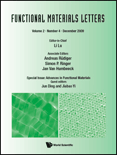
Functional Materials Letters
Scope & Guideline
Pioneering discoveries for tomorrow's technologies.
Introduction
Aims and Scopes
- Synthesis and Characterization of Functional Materials:
The journal focuses on novel methods for synthesizing functional materials, including nanomaterials, composites, and hybrid systems, while providing detailed characterization techniques to elucidate their properties. - Energy Storage and Conversion:
A core area of research involves materials for energy storage systems, such as batteries and supercapacitors, as well as catalysts for energy conversion processes, including fuel cells and solar energy applications. - Environmental Applications:
Research addressing the development of materials for environmental remediation, including photocatalysts for pollutant degradation and sensors for detecting environmental contaminants. - Smart and Responsive Materials:
The journal highlights studies on materials with tunable properties, such as hydrogels and shape-memory polymers, that respond to external stimuli for applications in soft robotics and biomedical devices. - Emerging Nanomaterials and Their Applications:
The focus is on nanostructured materials, including metal-organic frameworks and quantum dots, exploring their potential in various applications, particularly in electronics, photonics, and catalysis.
Trending and Emerging
- Advanced Energy Storage Solutions:
A significant trend is the focus on advanced materials for energy storage, particularly in the development of solid-state batteries and innovative electrode materials that enhance performance and safety. - Sustainable and Green Technologies:
Research on sustainable materials and processes is on the rise, with studies exploring eco-friendly synthesis methods and materials for environmental applications, including waste treatment and renewable energy. - Multifunctional Materials:
There is an increasing interest in multifunctional materials that combine properties such as conductivity, magnetism, and optical activity, leading to applications in sensors, actuators, and electronic devices. - 3D Printing and Additive Manufacturing of Functional Materials:
The integration of 3D printing techniques in the fabrication of functional materials is gaining traction, enabling the production of complex geometries and tailored properties for specific applications. - Health and Biomedical Applications:
There is a growing trend towards the development of functional materials for healthcare applications, including drug delivery systems, biosensors, and biocompatible materials for implants.
Declining or Waning
- Traditional Bulk Materials:
There is a noticeable decrease in publications focused on conventional bulk materials, as research trends shift towards nanostructured and composite materials that offer superior properties and functionalities. - Low-Performance Photocatalysts:
Research on simple, low-performance photocatalysts has waned, with a growing emphasis on developing advanced materials with enhanced photocatalytic efficiency and stability. - Basic Theoretical Studies Without Experimental Validation:
The journal has seen a decline in purely theoretical studies that lack experimental validation, reflecting a preference for comprehensive studies that combine theory with practical applications. - Limited Focus on Organic Materials:
There has been a reduced emphasis on organic materials for electronics and photonics, as the field moves towards exploring hybrid and inorganic materials that demonstrate superior performance.
Similar Journals

JOURNAL OF INORGANIC MATERIALS
Cultivating Insights for a Sustainable FutureJOURNAL OF INORGANIC MATERIALS, published by SCIENCE PRESS, is a prominent platform dedicated to the dissemination of research in the fields of inorganic chemistry and materials science. With a history spanning over three decades since its inception in 1993, this journal has become a key resource for academics and industry professionals alike, aiming to advance the understanding of inorganic materials through rigorous research findings. It operates under a strict peer-review process, ensuring high-quality contributions that uphold its reputation within the scientific community. Currently ranking in the Q3 category for both inorganic chemistry and miscellaneous materials science, the journal holds a significant position in Scopus rankings, further solidifying its relevance and impact. Researchers will find this journal an essential avenue for the latest discoveries and methodologies in inorganic materials, fostering innovation and collaboration in a vital area of science.
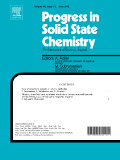
PROGRESS IN SOLID STATE CHEMISTRY
Pioneering Insights in Condensed Matter PhysicsPROGRESS IN SOLID STATE CHEMISTRY, published by PERGAMON-ELSEVIER SCIENCE LTD, serves as a pivotal platform for disseminating cutting-edge research and advancements in the field of solid state chemistry. With an impressive impact factor and a respected status, this journal consistently ranks in the Q1 category across multiple disciplines, including Condensed Matter Physics, Materials Science, and Physical and Theoretical Chemistry. Following a rigorous peer-review process, it features articles that explore theoretical frameworks and experimental findings, thereby fostering innovation and collaboration among researchers and professionals. Although it does not adopt an open access model, its substantial reach and high Scopus rankings—19th in Condensed Matter Physics, 14th in Physical and Theoretical Chemistry, and 48th in General Materials Science—underscore its influence in shaping the future of materials research. Established in 1964, the journal continues to contribute significantly to the academic community, bridging the gap between theory and practical application in solid state materials.
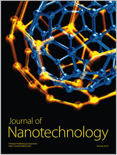
Journal of Nanotechnology
Transforming Materials Science Through Nanotech InsightsThe Journal of Nanotechnology, published by Hindawi Ltd., is a premier open-access platform dedicated to delivering high-quality research in the dynamic field of nanotechnology. With the ISSN 1687-9503 and E-ISSN 1687-9511, this journal has been at the forefront of disseminating innovative findings since its transition to open access in 2009, fostering a global dialogue among researchers, professionals, and students. Based in Egypt, the journal maintains its commitment to advancing the material science sector, currently holding a prestigious Q2 ranking in the 2023 Materials Science (miscellaneous) category, reflecting its significant contribution to the field. With a Scopus ranking of #162 out of 463 journals in General Materials Science, placing it in the 65th percentile, the Journal of Nanotechnology serves as a crucial resource for those looking to explore the latest advancements and applications in nanomaterials. The journal invites submissions that align with its scope, which emphasizes interdisciplinary approaches and novel methodologies, promising to enhance both academic and practical aspects of nanotechnology.

ACS Macro Letters
Transforming Ideas into Impactful ResearchACS Macro Letters, published by the American Chemical Society, is a leading journal in the fields of Inorganic Chemistry, Materials Chemistry, Organic Chemistry, and Polymers and Plastics. Established in 2012, this journal has swiftly ascended to the forefront of chemical research with an impressive reputation, as evidenced by its 2023 Scopus rankings placing it in the first quartile across multiple categories. The journal's objective is to disseminate timely and concise articles that advance the study of macromolecules and their applications, making it an essential resource for researchers, professionals, and students alike. With a focus on fostering innovation and facilitating collaboration within the chemical community, ACS Macro Letters presents a robust platform for scientists to share their groundbreaking findings. Being based in the United States, it serves as a central hub for global discourse in the chemical sciences, although it does not currently offer Open Access options. The journal's commitment to high-quality content is further underscored by its prestigious impact factor and acceptance into elite academic quartiles, signifying its influence and importance in shaping future research.
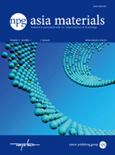
NPG Asia Materials
Pioneering Insights for a Material WorldNPG Asia Materials, a premier journal published by NATURE PORTFOLIO, stands at the forefront of research in the fields of condensed matter physics, materials science, and modeling and simulation. With an impressive Impact Factor gracing its Q1 rankings in 2023, this open-access journal, established in 2012, offers a vital platform for disseminating high-quality research articles, reviews, and perspectives that advance the understanding of material properties and innovative applications. Based in the United States and catering to a global audience, NPG Asia Materials features cutting-edge contributions that not only enhance academic scholarship but also provoke discussions relevant to both industry and academia. Researchers, professionals, and students are invited to explore its extensive archive of work, covering insights from 2009 to 2024, in a bid to stay abreast of the latest developments in these rapidly evolving scientific domains.

Frontiers of Materials Science
Fostering Collaboration for Tomorrow's Material SolutionsFrontiers of Materials Science is a groundbreaking journal dedicated to exploring advanced materials and their applications within the ever-evolving landscape of materials science. Published by HIGHER EDUCATION PRESS, this journal offers a crucial platform for scholars and practitioners seeking to disseminate innovative research findings that foster interdisciplinary collaboration. Since its inception in 2011, the journal has enjoyed a notable Q2 ranking in the category of Materials Science (miscellaneous) as of 2023, positioning it among the noteworthy publications in the field with a Scopus rank of #222 out of 463. While predominantly published in China, the journal is committed to open access principles, allowing global accessibility to cutting-edge research. With its comprehensive coverage spanning materials synthesis, characterization, properties, and applications, Frontiers of Materials Science not only serves as a repository for academia but also bridges the gap between research and industry, making it an indispensable resource for researchers, professionals, and students alike.

Nano Materials Science
Transforming Theoretical Insights into Practical Solutions.Nano Materials Science is a premier open-access journal dedicated to the dissemination of groundbreaking research in the fields of nanotechnology, materials science, and chemical engineering. Published by KEAI PUBLISHING LTD, this journal has quickly established itself as a leading platform in its area since its inception in 2019, with impressive rankings in the Scopus database, holding a Q1 position across multiple categories, including Chemical Engineering and Materials Science. Based in Beijing, China, Nano Materials Science provides researchers and practitioners access to a wealth of high-quality peer-reviewed articles, fostering innovation and collaboration within the scientific community. With its impact factor steadily rising and a commitment to open access, the journal aims to bridge the gap between theoretical research and practical applications, making it an essential resource for professionals and students eager to stay at the forefront of materials research and nanotechnology advancements.

APL Materials
Transforming ideas into impactful materials solutions.APL Materials is a prestigious open access journal published by AIP Publishing that has been at the forefront of disseminating cutting-edge research in the fields of materials science and engineering since its inception in 2013. With an impressive impact factor reflecting its significance, APL Materials ranks securely in the Q1 quartile in both Engineering (miscellaneous) and Materials Science (miscellaneous) categories, underscoring its role as a vital resource for innovative scientific inquiry. Ranked highly in Scopus, particularly in General Engineering (24/307) and General Materials Science (78/463), the journal provides a platform for researchers, professionals, and students to share their findings and advancements that push the boundaries of material applications. Furthermore, its open access policy ensures that high-quality research is freely available to a global audience, fostering collaborative advancements in the scientific community. As the journal continues to evolve through to 2024, it remains committed to presenting groundbreaking studies that contribute to the advancement of materials science and engineering disciplines.Explore APL Materials to stay at the cutting edge of research and innovation.

Materials Chemistry Frontiers
Shaping Tomorrow’s Materials with Today’s ResearchMaterials Chemistry Frontiers, published by the esteemed Royal Society of Chemistry, stands as a leading journal in the realm of materials science and chemistry, with an impressive Q1 ranking in both Materials Chemistry and Materials Science categories as of 2023. This open-access journal, operating from the United Kingdom, offers a platform for researchers, professionals, and students to disseminate high-quality, impactful research. With its E-ISSN 2052-1537, the journal is dedicated to publishing cutting-edge articles, reviews, and research communications that explore innovative materials and their applications, fostering a comprehensive understanding of the complex interplay between materials and their chemical properties. With consistent rankings in the Scopus metrics, being positioned at the 25th percentile among 317 in the Materials Chemistry category, it highlights its pivotal role in advancing the field. The journal thrives on contributions that broaden the scope of knowledge from 2017 to 2024 and beyond, solidifying its status as an essential resource for contemporary research in materials science.
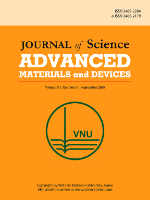
Journal of Science-Advanced Materials and Devices
Advancing Materials Science Through Open Access InnovationJournal of Science-Advanced Materials and Devices is a leading open-access journal published by Vietnam National University, dedicated to advancing the field of materials science through cutting-edge research and innovative developments. Since its inception in 2016, this journal has become a pivotal platform for sharing insights and discoveries in various subfields, including biomaterials, ceramics and composites, and electronic, optical, and magnetic materials. With impressive quartile rankings, including Q1 across multiple categories in 2023, and a notable Scopus ranking placing it in the top 15th percentile for ceramics and composites, it highlights the journal’s influence and prestige within the global academic community. Open Access since its launch, the journal aims to facilitate unrestricted dissemination of scholarly work, empowering researchers, professionals, and students to engage with the latest advancements. The Journal of Science-Advanced Materials and Devices is vital for those seeking high-quality contributions that influence both theoretical understanding and practical applications in the ever-evolving landscape of materials science.